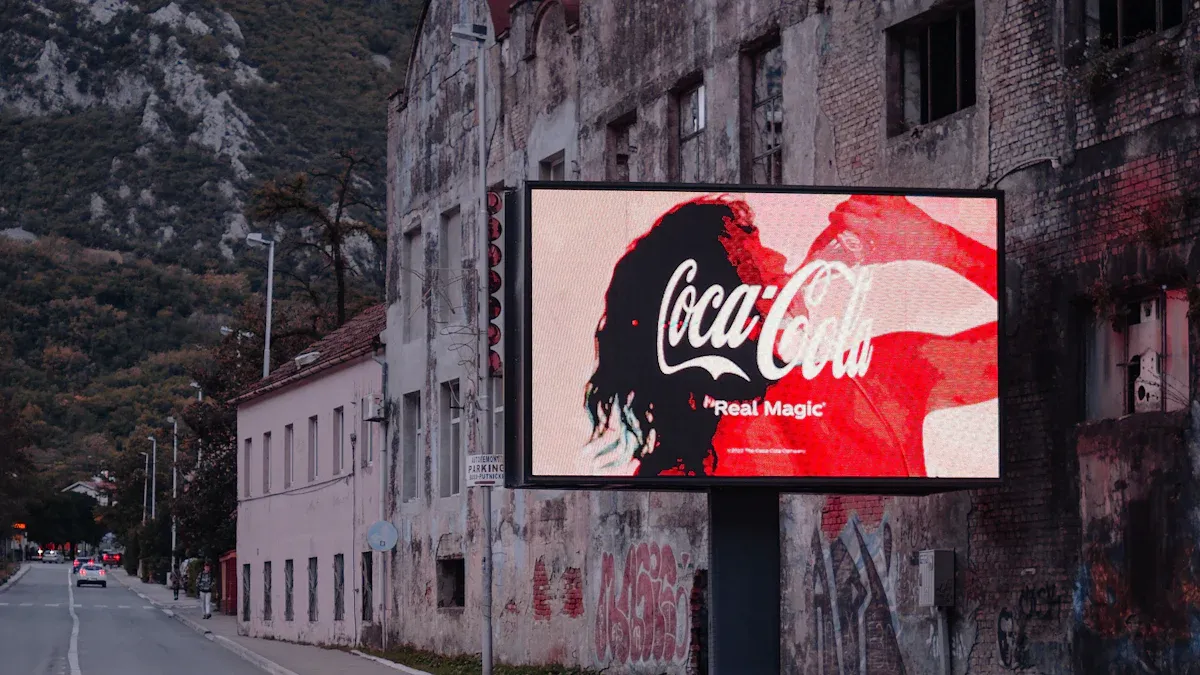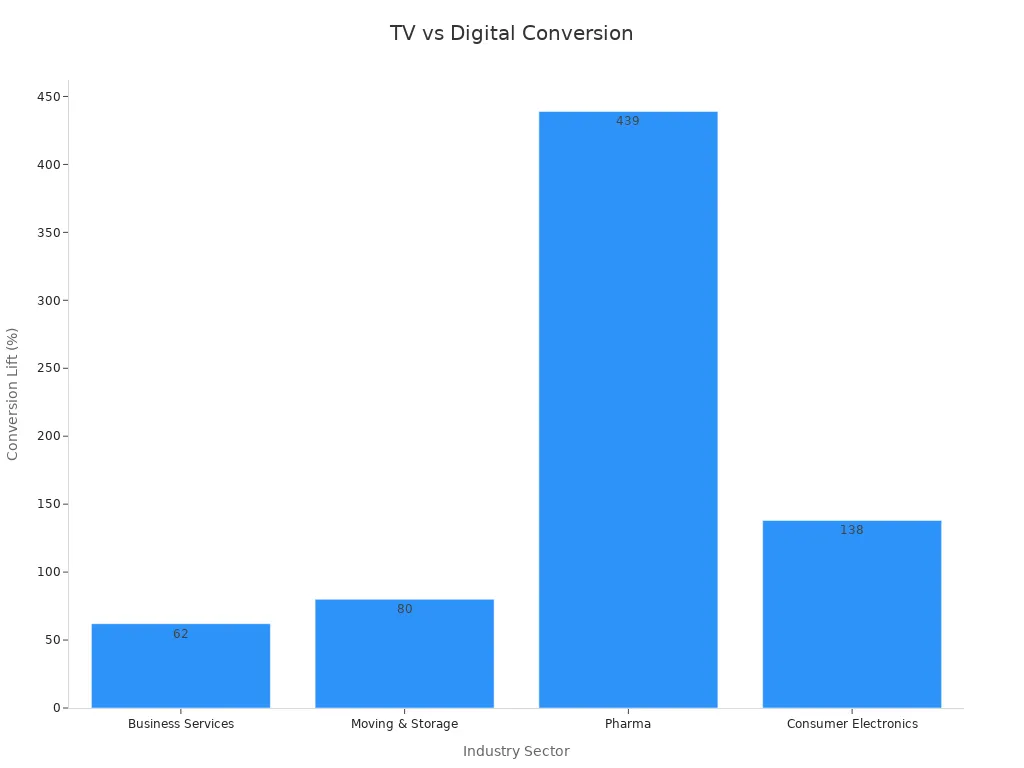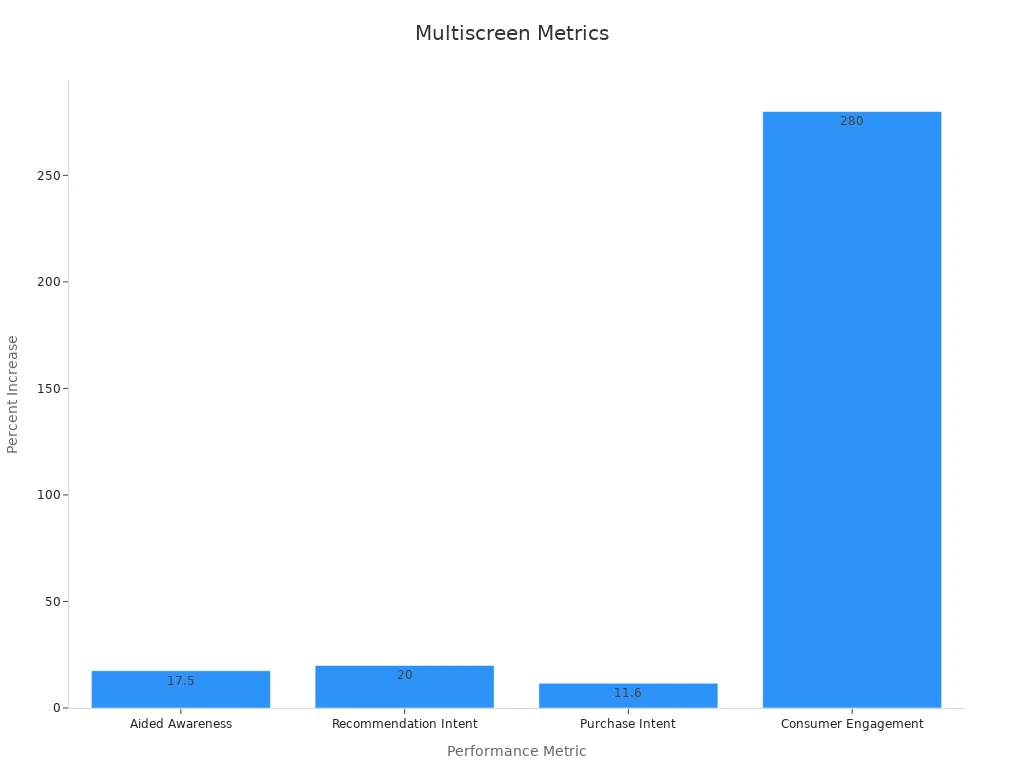How TV Ads Drive Results at Every Stage of the Marketing Funnel

TV ads, including Connected TV and multiscreen, help you reach people at every stage of the marketing funnel. Television stands out as a powerful medium because it brings together families and friends, making it easy for you to connect with broad and diverse audiences. Recent industry analysis shows that TV lets you target specific groups by choosing the right networks, shows, and times. With Connected TV, you can also create ads that speak to different backgrounds and cultures. Many viewers, especially Gen Z and millennials, want brands to show diversity in their ads. When you use the Funnels of TV ads, you can guide people from first learning about your brand to making a purchase while measuring your impact at each step.
Key Takeaways
TV ads reach large and diverse audiences, helping build strong brand awareness and making your brand memorable.
Connected TV and multiscreen ads let you target specific groups and track results across devices for better marketing impact.
TV ads guide customers through awareness, consideration, and conversion stages, boosting trust and driving purchases.
Pairing TV ads with digital tactics like search and social media creates a powerful 'halo effect' that lifts all marketing channels.
Measuring key metrics at each funnel stage and using data to optimize campaigns leads to better results and higher return on investment.
Funnels of TV Ads

The Funnels of TV ads help you guide people from first learning about your brand to making a purchase. You can use TV ads, Connected TV, and multiscreen strategies to reach your audience at every stage. Each stage—awareness, consideration, and conversion—plays a unique role in moving viewers closer to becoming customers. When you understand how the Funnels of TV ads work, you can create campaigns that deliver results you can measure.
Awareness
You start building awareness at the top of the Funnels of TV ads. TV ads reach large audiences and make your brand familiar to many people. Connected TV and multiscreen campaigns let you target specific groups, so your message reaches the right viewers. Studies show that TV ads have a strong impact on brand recall. For example, research finds that TV ads deliver 2.2 times higher unaided recall than the same ads on mobile screens. Marketing Mix Modeling and brand lift studies also show that TV advertising leads to higher sales and brand awareness over time.
TV ads create a "halo effect." When people see your ad on TV, they often search for your brand online or visit your website. Advanced tools now track these indirect effects, showing how TV ads boost branded search, direct site visits, and even conversions on other channels.
A real-world example comes from a study of first-time TV advertisers. Brands saw an average 12% increase in website traffic during their launch month. Some brands even saw up to 36% more traffic. This shows how the Funnels of TV ads can drive awareness and bring new visitors to your site.
Consideration
Once people know your brand, the next step in the Funnels of TV ads is consideration. Here, you want viewers to think about your product and see it as a good choice. TV ads help you build trust and interest by showing your brand’s values, features, and benefits. Connected TV lets you use data to target viewers who are more likely to consider your brand.
Brand lift studies measure how well your ads increase recall, consideration, and purchase intent. Metrics like search volume, website engagement, and email sign-ups show how interested people are after seeing your ad. For example, testimonial videos and product demos in your TV ads can build credibility and help viewers learn more about what you offer.
Metric Category | Specific Metrics / KPIs | Purpose / Insight |
|---|---|---|
Channel Data | Search volume, clicks | Shows what messaging attracts early-stage interest |
Website Engagement | Traffic, session duration, pages/session | Measures how deeply users explore your content |
UTM Tracking | Behavior flow, assisted conversions | Identifies which channels build trust and drive action |
Neurophysiological studies show that TV ads trigger emotional and cognitive responses, making viewers more likely to consider your brand. Real-time tracking also finds that positive TV ads increase brand consideration.
Conversion
The final stage of the Funnels of TV ads is conversion. Here, you want viewers to take action, such as making a purchase or signing up for a service. TV ads can drive conversions by using clear calls-to-action, special offers, and direct-response messaging. Connected TV and multiscreen strategies help you track conversions across devices, so you know which ads lead to sales.
Research shows that 30-second TV ads produce 24% higher conversion rates than 15-second ads. Some campaigns see conversion rates as high as 1.37% on certain networks. A TV campaign tracked by iSpot.tv reached 44% more viewers than its closest competitor and boosted conversion rates by 21% with a strong call-to-action.

Connected TV also drives strong results. One study found that 33% of adults purchased a product after seeing a CTV ad. TV ads increase website traffic and conversions across many industries, from business services to consumer electronics. The Funnels of TV ads let you measure these results and adjust your campaigns for even better performance.
Tip: Combining longer TV ads with shorter follow-up spots can boost memory effects by 51%, making your campaigns even more effective.
When you use the Funnels of TV ads, you can reach people at every stage, build trust, and drive real business results. TV advertising, including Connected TV and multiscreen, gives you the tools to measure and improve your marketing at every step.
TV Ads and Channel Integration

Pairing with Digital Tactics
You can boost your marketing results by pairing TV ads with digital tactics like search and social retargeting. When you run TV ads, especially on Connected TV, you often see more people searching for your brand or visiting your website soon after. This happens because TV ads spark interest and drive viewers to take action online.
TV ads cause quick spikes in web traffic and keyword searches, showing their immediate impact on digital engagement.
When you combine TV ads with paid search and social campaigns, you create a "halo effect" that lifts the performance of all channels.
TV ads can drive more online shopping and increase click-through rates on digital ads.
Demographic factors matter. You can optimize your campaigns by targeting the right audience across both TV and digital platforms.
Running CTV alongside paid search and social helps you avoid performance plateaus. You can shift budget from underperforming keywords to CTV, which often leads to a higher return on ad spend (ROAS). Marketers use metrics like ROAS, cost-per-visit, impressions, and conversions to track the success of these integrated campaigns.
Tip: Define clear goals for each channel. Use TV ads to build awareness and digital tactics to capture interest and drive conversions.
Multiscreen Strategies
Multiscreen strategies let you reach your audience wherever they watch—on TV, laptops, tablets, or phones. This approach increases your brand’s visibility and keeps your message top of mind.
A multiscreen campaign can deliver strong results:
A GI brand used AI-driven targeting in a multiscreen campaign and achieved a 10:1 ROAS.
Advertisers who use audience targeting in multiscreen TV see a 40% rise in ad views.
Multiscreen TV ads in premium video environments improve brand recall and favorability.
Research shows that multiscreen campaigns boost ad memorability by 73% and can lead to a 2.8X higher conversion rate. You also see a 15X higher ROAS at the action stage. These results prove that multiscreen TV is effective for both building awareness and driving purchases.
Impact of Multiscreen Strategy (CTV + Digital + Linear TV) | Notes/Highlights | |
|---|---|---|
Aided Awareness | +17.5% overall; +17.4% among 18-34 year olds | Higher lift among younger demographics |
Recommendation Intent | +20% | Stronger consumer advocacy |
Purchase Intent | +11.6% | Increased likelihood to buy |
Ad Recall | Increased with exposure on four screens | Based on Comscore study of 400+ campaigns |
Incremental Reach | Higher incremental lift on CTV and digital vs. linear TV | Sustained lift in early campaign days |
Consumer Engagement | Up to 280% improvement in engagement | Deeper audience interaction |
Brand Favorability | Increased with multiscreen exposure | Enhances brand perception |
Website & App Traffic | Improved mid-funnel metrics | Supports conversion funnel effectiveness |

By using TV ads together with digital and multiscreen strategies, you can reach more people, build stronger connections, and drive better business results.
Measuring TV Ad Impact
Metrics by Funnel Stage
You need to measure the impact of your TV ads at every stage of the marketing funnel. Each stage—awareness, consideration, and conversion—uses different key performance indicators (KPIs). Setting clear, SMART goals for these KPIs helps you track progress and make better decisions.
Here is a table that shows important KPIs for each funnel stage:
Funnel Stage | KPIs / Metrics | Measurement Tools / Methods |
|---|---|---|
Awareness | Impressions, Reach, Video Completion Rate (VCR), Brand Recall | Ad servers, DSPs, pixel tracking, brand lift surveys |
Consideration | Website Visits, QR Code Scans, Click-Through Rate, Brand Lift (recall, consideration) | Pixel placement, QR codes, surveys, web analytics |
Conversion | Conversion Rate, Sales Lift, Customer Acquisition Cost (CAC), Return on Ad Spend (ROAS) | Tracking pixels, sales data, attribution models, Marketing Mix Modeling (MMM) |
You can also use advanced tools like Automatic Content Recognition (ACR) in smart TVs and set-top box data to track real-time ad exposure and viewer behavior. These tools help you see how many people saw your ad, how often, and what actions they took next.
Tip: Use both short-term and long-term metrics. Track immediate web visits and conversions, but also measure brand recall and sales growth over time.
Optimizing Campaigns
You can improve your TV ad campaigns by using data-driven methods. Start by measuring each ad’s performance by time, day, and placement. Test different ad lengths, creative styles, and channels. Analyze which combinations work best for your goals.
Personalize your ads using customer data to boost engagement.
Segment your audience by age, location, or interests for better targeting.
Use real-time analytics to adjust your campaign while it runs.
Apply frequency caps to avoid showing the same ad too often.
Bayesian Optimization and Marketing Mix Modeling help you make smarter decisions. These models use real-time data to update your strategy, shift budgets, and improve ROI. By tracking reach, frequency, engagement, and conversions, you can spot trends and refine your approach.
Note: Continuous testing and learning lead to better results. Always review your data, make changes, and measure again. This cycle helps you get the most from your TV ad investment.
TV ads, including Connected TV and multiscreen, help you drive results at every stage of the marketing funnel. You can see measurable outcomes in many industries:
Industry Sector | Full-Funnel Outcomes Demonstrated |
|---|---|
Entertainment | Increased tune-ins, SVOD subscriptions, digital engagement |
Financial & Insurance | Customer base growth, conversions, app downloads |
Health, Wellness & Beauty | Improved brand perception, app users, registrations |
Retail | Ecommerce engagement, website traffic, sales |
You can boost your results by pairing TV with digital channels. Use these attribution models to measure success:
First-Touch Attribution
Last-Touch Attribution
Multi-Touch Attribution
View-Through Attribution
Micro-Conversions
Try these strategies to unlock TV’s full potential and track your impact at every step.
FAQ
How do TV ads help you reach new customers?
TV ads show your brand to many people at once. You can use Connected TV to target certain groups. This helps you find new customers who may not know about your brand yet.
Can you measure the results of TV ads?
Yes, you can track results using tools like brand lift surveys, website analytics, and sales data. These tools show how many people saw your ad and what actions they took next.
What is the best way to combine TV ads with digital marketing?
You can run TV ads together with search and social campaigns. This approach increases brand searches and website visits. Use TV for awareness and digital channels for conversions.
Do TV ads work for small businesses?
Yes, small businesses can use TV ads, especially Connected TV, to reach local or niche audiences. You can set a budget that fits your needs and measure results to see what works best.
Tip: Start with a clear goal for your TV ad campaign. Track your results and adjust your strategy for better outcomes.
See Also
Understanding How Marketing Funnels Function In Advertising
Ways Artificial Intelligence Enhances Sales Funnels For Growth
Top Five Methods AI Boosts Social Media Advertising Results
